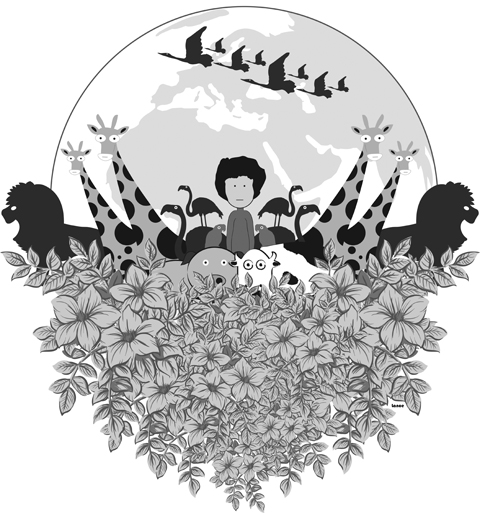The “alarming” rate at which species are being lost could have a severe effect on humanity, conservationists warned on Monday. Targets set eight years ago by governments to reduce biodiversity loss by this year have not been met, experts confirmed at a UN meeting in Nairobi, Kenya.
The third Global Biodiversity Outlook report said loss of wildlife and habitats could harm food sources and industry, and exacerbate climate change through rising emissions.
Achim Steiner, the executive director of the UN Environment Program (UNEP), said: “Humanity has fabricated the illusion that somehow we can get by without biodiversity or that it is somehow peripheral to our contemporary world: The truth is we need it more than ever on a planet of 6 billion [people], heading to over 9 billion by 2050. Business as usual is no longer an option if we are to avoid irreversible damage to the life-support systems of our planet.”

The report confirms what a coalition of 40 conservation organizations said last month, when they claimed there have been “alarming biodiversity declines.” The coalition said that pressures on the natural world from development, over-use and pollution have risen since the ambition to reduce the rate of biodiversity loss was set out in the 2002 Convention on Biological Diversity (CBD).
The first formal assessment of the target, published at the end of last month in the journal Science, is the basis of Monday’s formal declaration. This week’s meeting will see governments pressed to take the issues as seriously as climate change and the economic crisis.
“Since 1970 we have reduced animal populations by 30 percent, the area of mangroves and sea grasses by 20 percent and the coverage of living corals by 40 percent,” said Joseph Alcamo, chief scientist of the UNEP.
“These losses are clearly unsustainable, since biodiversity makes a key contribution to human well being and sustainable development,” he said.
The Science study compiled 30 indicators of biodiversity, including changes in populations of species and their risk of extinction, the remaining areas of different habitats and the composition of communities of plants and animals.
“Our analysis shows that governments have failed to deliver on the commitments they made in 2002: Biodiversity is still being lost as fast as ever, and we have made little headway in reducing the pressures on species, habitats and ecosystems,” said Stuart Butchart, the paper’s lead author.
“Our data shows that 2010 will not be the year that biodiversity loss was halted, but it needs to be the year in which we start taking the issue seriously and substantially increase our efforts to take care of what is left of our planet,” he said.
The failure to meet the CBD target will not be a surprise to experts or policymakers, who have warned for years that too little progress was being made. Last month the head of the International Union for the Conservation of Nature species survival commission, Simon Stuart, told the Guardian that for the first time since the dinosaurs, species were believed to be becoming extinct faster than new ones were evolving.

In the past month, two important developments are poised to equip Taiwan with expanded capabilities to play foreign policy offense in an age where Taiwan’s diplomatic space is seriously constricted by a hegemonic Beijing. Taiwan Foreign Minister Lin Chia-lung (林佳龍) led a delegation of Taiwan and US companies to the Philippines to promote trilateral economic cooperation between the three countries. Additionally, in the past two weeks, Taiwan has placed chip export controls on South Africa in an escalating standoff over the placing of its diplomatic mission in Pretoria, causing the South Africans to pause and ask for consultations to resolve
An altercation involving a 73-year-old woman and a younger person broke out on a Taipei MRT train last week, with videos of the incident going viral online, sparking wide discussions about the controversial priority seats and social norms. In the video, the elderly woman, surnamed Tseng (曾), approached a passenger in a priority seat and demanded that she get up, and after she refused, she swung her bag, hitting her on the knees and calves several times. In return, the commuter asked a nearby passenger to hold her bag, stood up and kicked Tseng, causing her to fall backward and
In December 1937, Japanese troops captured Nanjing and unleashed one of the darkest chapters of the 20th century. Over six weeks, hundreds of thousands were slaughtered and women were raped on a scale that still defies comprehension. Across Asia, the Japanese occupation left deep scars. Singapore, Malaya, the Philippines and much of China endured terror, forced labor and massacres. My own grandfather was tortured by the Japanese in Singapore. His wife, traumatized beyond recovery, lived the rest of her life in silence and breakdown. These stories are real, not abstract history. Here is the irony: Mao Zedong (毛澤東) himself once told visiting
When I reminded my 83-year-old mother on Wednesday that it was the 76th anniversary of the founding of the People’s Republic of China, she replied: “Yes, it was the day when my family was broken.” That answer captures the paradox of modern China. To most Chinese in mainland China, Oct. 1 is a day of pride — a celebration of national strength, prosperity and global stature. However, on a deeper level, it is also a reminder to many of the families shattered, the freedoms extinguished and the lives sacrificed on the road here. Seventy-six years ago, Chinese Communist leader Mao Zedong (毛澤東)